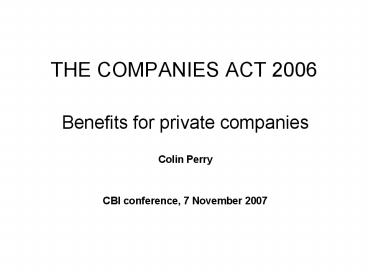THE COMPANIES ACT 2006 - PowerPoint PPT Presentation
1 / 11
Title:
THE COMPANIES ACT 2006
Description:
longest Act in parliamentary history. complex transitional arrangements, ... reductions in capital court approval replaced by directors' solvency statement ... – PowerPoint PPT presentation
Number of Views:318
Avg rating:3.0/5.0
Title: THE COMPANIES ACT 2006
1
THE COMPANIES ACT 2006
- Benefits for private companies
- Colin Perry
- CBI conference, 7 November 2007
2
Bad news/good news
- biggest overhaul of company law since 1947 Act
- longest Act in parliamentary history
- complex transitional arrangements, phased
introduction - BUT
- easy to read, plain English, logical arrangement
- enables private companies to DIY (thus cutting
costs) - deregulatory
3
What is a private company?
- defined as any company that is not a public
company! - private companies cannot offer securities to the
public - limited by shares or by guarantee
- includes subsidiaries of public companies
- 2.4 million active companies in GB
- 99.5 of companies are private
4
Think small first
- guiding principle of the Company Law Review
1998-2001 and of the 2006 Act - previous Acts top down public companies first,
then exemptions for private companies - new Act starts with basic private company model,
then adds provisions for large/public companies - now pointless for private companies to register
as plc
5
Simpler formation, registration
- minimal Memorandum no objects clause required
- existing companies objects entrenchment
clauses treated as Articles, subject to amendment
or deletion - no requirement to state authorised capital limits
- Model Articles for private companies
- - default option if none registered (cuts costs)
- - simpler, shorter than old Table A
- - may be suitable for companies with single or
controlling shareholder (e.g. subsidiaries,
family companies)
6
Easier operating rules
- not required to have company secretary
- can avoid public disclosure of directors home
addresses - directors duties made transparent accessible
- loans to directors permitted, with shareholder
approval - electronic communication valid as written
communication (show company no. and reg. office
on emails, websites)
7
Less need for shareholder meetings
- no requirement for AGMs, unless requested by 10
of shareholders (or 5 in some cases) - no need to lay accounts or appoint auditors at
meetings - easier procedure for written resolutions by
shareholders (gt50 or 75 approval instead of
unanimity) - board can resolve directors conflicts of
interest without calling meeting
8
Flexibility in capital transactions
- private companies no longer prohibited from
giving financial assistance for purchase of own
shares - reductions in capital court approval replaced
by directors solvency statement - (similar to current rules for redemptions out of
capital)
9
Small companies accounting exemptions
- confirmation of audit exemption
- filed version of accounts may omit PL,
directors report, directors remuneration - simpler balance sheet for filed version
10
SMEs future deregulation?
- European Commission considering allowing States
to - exempt micro entities from accounting directives
- exempt medium-sized companies from audit
- abolish need for SMEs to account for deferred tax
- abolish need for SMEs to analyse turnover in
accounts - allow nil par value for shares
11
A European Private Company?
- Commission currently consulting on EPC as a form
of private company registrable in any member
state - aim to reduce cost of registering companies in
other states for large public groups as well as
SMEs - HOWEVER
- UK Limited is already corporate form of choice in
Europe - (30,000 German businesses have registered as UK
Ltds) - France has enacted a simplified private company
law Germany is reforming its GmbH law - Does British business support the EPC proposal?






























